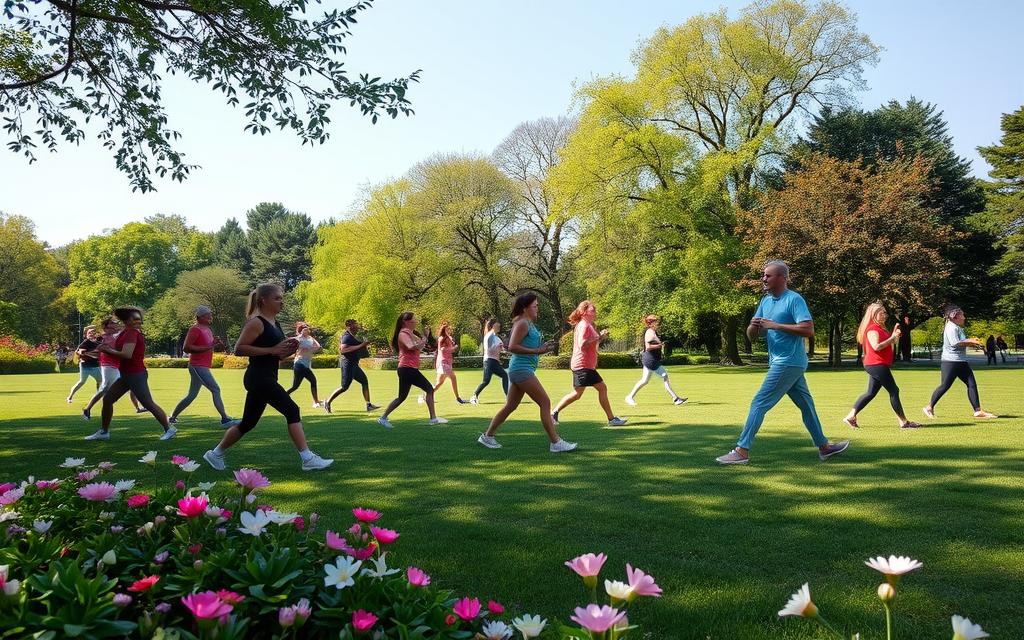Did you know that just 30 minutes of exercise each day can greatly improve your mental health? That’s true, physical activity is a great way to fight mental health issues like depression and anxiety. It can even help prevent cognitive decline. In this article, we’ll look at how exercise can change your mental health for the better. I’ll also share tips to help you start exercising.
I’ve seen how regular physical activity can lift your mood. Whether it’s a quick walk, a yoga class, or a tough workout, moving your body changes your mind and feelings. It can make you feel better about yourself. Let’s explore how how exercise changes your mental health, exercise benefits mental health, workout mental health effects, physical activity psychological impact, and the fitness mood boosting effects of being active.
The Benefits of Physical Activity for Mental Well-being
Being active isn’t just good for our bodies; it’s also key for our minds. It helps improve our mood and boosts our self-esteem. The perks of moving more are many and big.
What is Physical Activity?
Physical activity covers a lot, from simple tasks like walking or gardening to more intense exercises like jogging or cycling. Any movement that gets you moving and burns energy counts as physical activity.
Impact on Mood, Stress, and Self-Esteem
Studies prove that regular exercise can make us feel better. Even a quick 10-minute walk can make us more alert, energetic, and happy. It also lowers stress and can fight off anxiety and depression by changing how our body handles stress.
Exercise can make us feel better about our bodies and our achievements. Seeing progress in our workouts makes us more confident and capable. This can improve our overall happiness.
Adding physical activity to our day can greatly help our mental health. By knowing how different activities affect our mood and self-esteem, we can choose better for our well-being.
Exercise: A Natural Remedy for Depression and Anxiety
I’ve faced mental health challenges and found a powerful solution – exercise. Studies show that activities like jogging, swimming, and cycling help with depression. They work well alone or with other treatments.
Exercise does more than make us fit; it boosts our mental health too. It lowers anxiety in mild cases and can help treat clinical anxiety. This method is cost-free, has no side effects, and helps us manage our mental health.
The benefits of exercise as treatment for depression and anxiety are amazing. Physical activity benefits for mental health include better mood, higher self-esteem, less stress, and a sense of control. Adding exercise to our daily life helps us take charge of our mental health.
“Exercise is not just about physical health – it’s a powerful tool for improving our mental wellbeing too. Embrace it as a natural remedy and experience the transformative effects for yourself.”
If you’re dealing with depression, anxiety, or want to boost your mental health, try exercise. It could be the natural solution you’ve been looking for.
Staying Active to Prevent Cognitive Decline and Dementia
As we get older, the fear of losing our mental abilities grows. But, there’s hope – physical activity can fight cognitive decline and dementia. Studies show that regular exercise can cut the risk of dementia by 20-30%.
The connection between exercise and brain health is clear. It does more than keep our bodies fit. It also feeds our minds, protecting against aging and dementia.
The Protective Power of Physical Activity
For older adults, exercise helps keep their minds sharp. It prevents cognitive decline. For those with dementia, physical activity can slow down symptoms, keeping them independent longer.
Exercise boosts brain health in many ways. It increases blood flow to the brain, bringing oxygen and nutrients. It also helps grow new brain cells and strengthens connections, improving thinking skills. Plus, it lowers inflammation and oxidative stress, which harm brain health.
| Benefit | Impact on Brain Health |
|---|---|
| Increased blood flow | Delivers oxygen and nutrients to the brain |
| Neurogenesis | Stimulates the growth of new brain cells |
| Reduced inflammation | Decreases a key driver of cognitive decline |
So, if you want to keep your mind clear or support someone with dementia, stay active. It’s a key way to keep your brain healthy. Put on your sneakers and move around – your brain will be grateful.
How Exercise Changes Your Mental Health
Regular physical activity greatly improves our mental health. It helps reduce anxiety and depression, and boosts self-esteem and cognitive function. [https://donotresus.me/my-thoughts/life-is-whatever-you-want-it-to-be/]
Exercise helps people feel better about themselves and connect with others. It releases endorphins, making us happier. This can help people feel more confident and connected.
Exercise also makes our minds work better. It improves memory, attention, and problem-solving skills. This is key as we get older, helping keep our brains healthy and preventing decline.
“Exercise is not just about physical health – it’s a powerful tool for improving mental well-being as well. The connection between the mind and body is undeniable, and by embracing an active lifestyle, we can unlock the door to a happier, healthier life.”
Exercise has a huge impact on our mental health. It can help manage anxiety, improve mood, and keep our minds sharp. By embracing the mind-body connection, we can live a more vibrant, fulfilling life.
Getting Started: Finding the Right Fit for You
Finding the right exercise is key to sticking with it. Whether you like indoor or outdoor activities, or prefer working out alone or with others, the right choice matters. It makes a big difference in reaching your fitness goals.
Overcoming Barriers to Physical Activity
Many people don’t exercise because of cost, injuries, lack of energy, or fear of not doing well. But, with the right support, these issues can be solved. First, look into affordable and easy-on-the-joints options that suit your needs.
Not feeling motivated? Try getting friends or family to join your fitness path. Being with others makes exercise more fun and keeps you on track. Also, celebrating your small wins can boost your confidence and keep you moving forward.
For lasting fitness, make it something you enjoy. Keep trying different activities until you find one that really gets you excited. This way, it becomes a natural part of your life.
| Barrier | Solution |
|---|---|
| Cost | Explore free or low-cost options, such as bodyweight exercises, walking, or community fitness programs |
| Injury Concerns | Start with low-impact activities and consult a healthcare professional to develop a safe, personalized plan |
| Lack of Energy | Gradually build up your fitness level, and consider incorporating energizing activities like yoga or tai chi |
| Fear of Failure | Focus on your personal progress, not comparisons to others, and celebrate small victories along the way |
“The hardest step is the first one, but once you get started, the rest will follow. Remember, the journey is the destination – so enjoy the process and don’t be too hard on yourself.”
Meeting the Recommended Activity Levels

“An active body leads to a healthy mind.” Health experts say adults should aim for daily physical activity. They should do at least 2.5 hours of moderate-intensity exercise each week. This goal is easier to reach by doing 10-minute sessions all day.
The guidelines for exercise recommend brisk walking for 30 minutes, five times a week. This is a great way to hit the physical activity levels we need. By adding this simple routine to our daily life, we gain huge benefits for our body and mind.
“The key to unlocking the power of physical activity lies in consistent, manageable steps. Small changes can lead to big improvements in our overall health and happiness.”
Following the guidelines for exercise might seem hard at first, but the benefits are huge. By staying active, we boost our mood, reduce stress, and improve our thinking skills. It’s time to see the power of moving and use our mind-body connection fully.
Starting a healthier, happier life begins with one step. So, let’s put on our sneakers, go outside, and start a journey. This journey will better our physical health and feed our mental well-being.
The Mind-Body Connection: Exercise for Mental Illness
Exercise is often seen as just for the body, but it’s a key part of mental health care too. People with serious mental illnesses like schizophrenia often gain weight from their meds. This makes exercise even more important for them.
Benefits for Schizophrenia and Other Serious Mental Illnesses
Research shows that exercise helps those with schizophrenia and other serious mental health issues. Physical activity can help with weight control, fitness, and energy. It also helps reduce mental health symptoms.
- Improved weight management and metabolic health
- Enhanced cardiovascular fitness and muscular strength
- Reduced risk of chronic diseases associated with mental illness
- Alleviation of symptoms like depression, anxiety, and cognitive impairment
- Increased social engagement and overall quality of life
The link between the mind and body is clear. Exercise benefits for mental illness can change lives. Adding physical activity to mental health care helps people with serious conditions take charge of their recovery.
“Exercise is not just about physical health – it’s a powerful tool for improving mental well-being, especially for those living with serious mental illnesses.”
| Condition | Exercise Benefits |
|---|---|
| Schizophrenia | Improved weight management, enhanced cardiovascular fitness, reduced symptoms |
| Bipolar Disorder | Stabilized mood, decreased depression and anxiety, increased energy |
| Major Depressive Disorder | Alleviation of depressive symptoms, improved self-esteem, better sleep |
Integrating Exercise into Mental Health Care

As a mental health professional, I believe adding physical activity to treatment plans can change lives. Exercise can deeply affect mood, stress, and well-being. That’s why I push for more exercise in mental health care.
Adding exercise to mental health treatment should be done in many ways. Mental health experts should use evidence-based physical activity interventions that fit each person’s needs. This mix of methods can greatly help those with serious mental health issues.
This method has many benefits. Physical activity in mental health services can ease depression and anxiety, boost self-confidence, and enhance overall mental health. It also helps prevent cognitive decline and lowers dementia risk.
While we need more research, the current evidence is strong. By creating custom exercise plans, mental health professionals can help patients take charge of their recovery. This leads to better mental health over time.
“Exercise is not just about physical health – it’s a powerful tool for improving mental well-being too. As mental health professionals, we have a responsibility to make the most of this powerful resource.”
I’m excited to see more clinics and practitioners using this holistic approach. It benefits both providers and patients, leading to better mental health for those in need.
Conclusion
Thinking about how exercise helps our mental health makes me remember an old saying, “a healthy mind in a healthy body.” This saying is very true today. Studies show that regular exercise is great for our feelings and thinking.
Exercise can make us feel happier, less stressed, and keep our minds sharp. It even helps with mental health issues. By exercising every day, we can greatly improve our mental health and overall happiness. The importance of daily exercise for our mental health is huge. Experts should use it more in treating mental health issues, along with other treatments.
I’m looking forward to seeing how exercise changes my mental and emotional health. The key to a balanced mind might be in the daily steps we take. So, let’s put on our sneakers, start moving, and discover the power of our mind and body connection.

